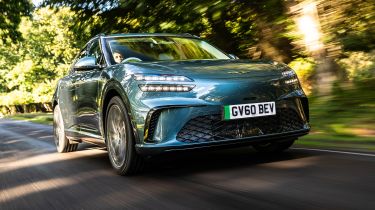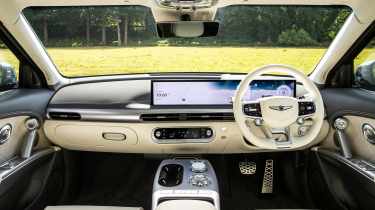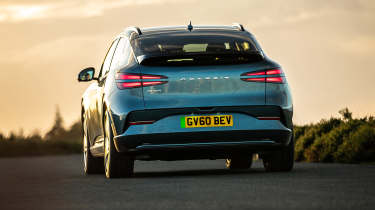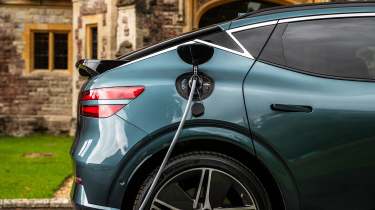New Genesis GV60 Pure 2025 review: a capable EV that’s often overlooked
The GV60 isn’t quite as popular as its Ioniq 5 and EV6 siblings, but perhaps it should be

Verdict
There is really very little reason not to consider the Genesis GV60 alongside premium rivals such as the Audi Q4 e-tron and Volvo EC40. This mid-cycle update gives it a cleaner look, a gorgeous, user-friendly infotainment package, and even a smidge more range. It’s competitively priced, and that 800-volt electrical architecture ensures it trumps every main rival for ultra-rapid charge times, too. If you can bring yourself to try something new, the GV60 could be a really rewarding car to live with.
If you ever travel to Korea, you’ll notice that along with all the Hyundai and Kia cars, there are plenty of Genesis models lining the city streets. The locals are a patriotic bunch, but the premium brand’s appeal in the western world has so far struggled to gain traction.
On face value, it’s not difficult to see why. The Brits, in particular, are fierce badge snobs; swapping your trusted Audi, BMW or Mercedes for a little-known upmarket sub-brand – no matter how plush or polished – is a tough sell.
But now that the company has been around for a few years, the time has come for a host of product refreshes. Genesis kicked things off with a lightly tweaked GV70, followed quickly by the much-improved and elongated Electrified G80. But now’s the time for the firm’s only ground-up EV: the swoopy GV60 SUV.
Used - available now
Leading the changes for this Audi Q4 e-tron and Volvo EC40 alternative is a cleaner, more modern look, with extra body-coloured trim, reprofiled bumpers and sills, plus new Micro Lens Array headlights. Each of the three wheel designs has been updated, too.
Inside, the big news comes courtesy of a glorious, 27-inch panoramic OLED screen that stretches from behind the new ‘D-shaped’ steering wheel right across the dashboard in a single, unbroken display. It not only looks great, but also offers excellent functionality and easy-to-decipher menus, each hidden behind clearly labeled tiles. The instrument cluster is customisable, complemented by a helpful head-up display.
Genesis seems to be one of the few brands not scared to still fit physical buttons for key controls, which is a boon in this day and age. There’s a row of piano-style shortcuts below a small screen for the climate functions, but proper rocker switches for the temperature adjustment. There’s a big rotary dial on the centre console for the infotainment display, while the ‘Crystal Sphere’ revolving gear selector has been carried over from the old car. Some might find it slightly chintzy, but we love that it’s a bit different.
Elsewhere, there are fresh upholstery designs and colours, plus a new wireless phone charger and digital rear-view mirror. We don’t usually like these, but given that the rear window is split in two by the rear spoiler, we found it quite useful. Our only complaint is that it makes it feel like trailing traffic is bearing down on you, when in reality it’s much further away than it appears.
Quality, on the whole, is very good. If you look closely, the stitching on the doors and dash isn’t quite as straight as it could be, but the general fit and finish is easily a match for Europe’s premium marques – and arguably surpasses them in some areas.
There are a number of changes under the skin, as well. The upgraded ‘fourth-generation’ battery sees capacity increase to 84kWh (80kWh usable), which in our ‘Pure’ test model sees a 27-mile boost to the car’s WLTP range. We averaged about 3.8mi/kWh during our test, which should see a real-world return of more than 300 miles on a charge; the true benchmark for any long-legged EV these days.
Being based on Hyundai’s 800-volt electrical architecture – shared with the Hyundai Ioniq 5 and Kia EV6 – the GV60 can charge at up to 240kW. A 10 to 80 per cent charge is still possible in 18 minutes, despite the increased battery capacity and usable range. It means you can plug in, grab a coffee, and your car be ready for the onward journey. And that’s not just marketing hyperbole – we’ve tried it and can vouch for it.
To drive, the revised Genesis GV60 doesn’t feel all that different to the car it replaces. It’s particularly refined for a car in its class – especially on the Pure’s 19-inch wheels – which, complemented by a relatively plush ride, a long range and fast charging, makes it a worthy motorway companion. We found it stable at 70mph, with just enough power to make light work of last-minute lane changes or overtakes.
Of course, if you need more power, you can step up to the dual-motor Sport model, which gets a near-100bhp boost to 314bhp, with torque swelling to 605Nm. We’ve not tried this version yet, but given the £4,400 premium (less severe when spread over a three-year lease deal) it could represent a suitable sweet spot between the base car and the flagship Performance variant.
Regardless, even in its lowest trim and motor specification, the GV60 has a strong chassis that resists roll, plus sharp steering and decent grip. The traction control can hamper proceedings at times; we experienced a total loss of power pulling away from a gravel driveway onto a main road, which could prove problematic if you’re attempting to squeeze into fast-moving traffic. Lifting off and reapplying the power overcame the issue, no harm done.
We found the new Smart Regenerative Braking 3.0 system worked wonderfully. There are three strengths, plus a one-pedal mode and an intelligent set-up, which uses “live traffic and map data to automatically adjust regenerative braking force for deceleration at speed cameras, roundabouts, curves, and speed bumps”. It’s far from faultless, but among the best systems we’ve used to date.
As with any coupe-styled crossover, you won’t find as much space in the back as you might in a conventional SUV, although the compromises are minimal given that bespoke electric platform. The floor is completely flat, for example, and without the optional panoramic roof, we didn’t find headroom too much of an issue – though the dark headlining and side-window blinds can make you feel a little hemmed in.
The 432-litre boot is a reasonable, if not class-leading – a Q4 e-tron, on paper, offers over 100 litres more – but the seats fold almost completely flat, allowing owners to slide longer items in without too much challenge. There’s also a storage compartment in the nose for keeping the charge cables – something the BMW iX2 misses out on.
Every version of the GV60 gets electrically operated heated front seats and a heated steering wheel, dual-zone climate control and a powered tailgate. Also included is that wonderful 27-inch screen, plus LED lights, an energy-saving heat pump and a host of safety and driver-assistance systems.
Sport upgrades the 19-inch wheels to 20 inches, and brings that more powerful dual-motor powertrain. Performance (+£9,200) is a bigger step up, but brings some of the clever kit found on the Ioniq 5 N, including Virtual Gear Shift, dynamic torque vectoring and an electronic limited-slip differential. The Comfort Pack, Innovation Pack and Nappa Leather Pack are also included.
As before, every model also comes with a five-year, unlimited-mileage warranty, plus five years’ servicing and five years’ roadside assistance – all part of the Genesis 5-Year Care Plan.
| Model: | Genesis GV60 Pure |
| Price: | £54,115 |
| On sale: | Now |
| Powertrain: | 84kWh battery, 1x e-motor |
| Power/torque: | 226bhp/350Nm |
| Transmission: | Single-speed automatic, rear-wheel drive |
| 0-62mph/top speed: | 7.8 seconds/115mph |
| Range: | 348 miles |
| Max. charging: | 240kW (10-80% in 18 mins) |
| Size (L/W/H): | 4,545/1,890/1,580mm |
Latest Genesis deals











